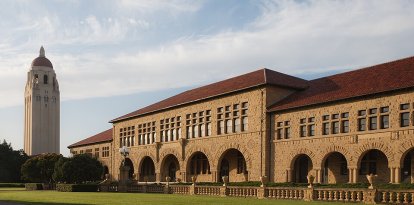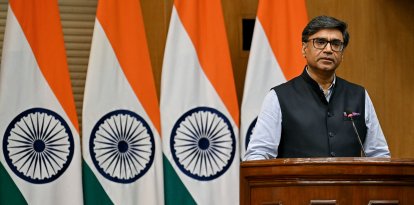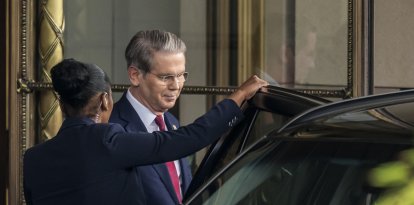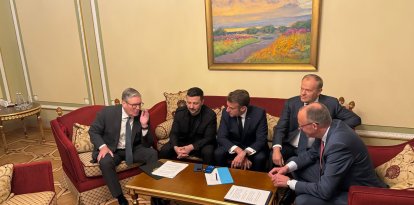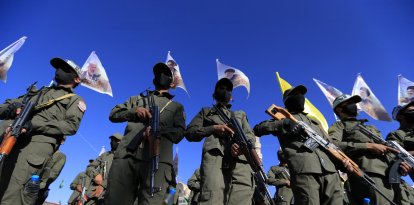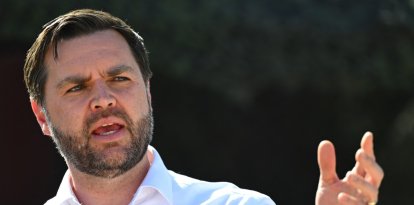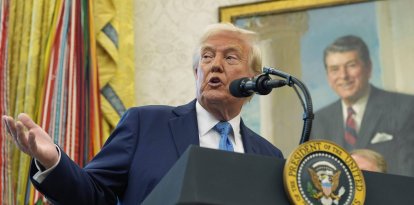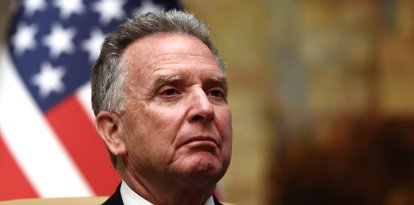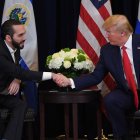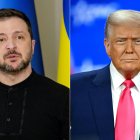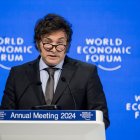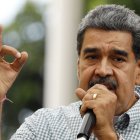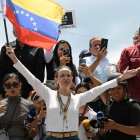Trump turns away from Europe to Latin America: Sees Milei, Bukele, & María Corina Machado as allies
The decision comes after the heated discussion with Ukrainian President Volodymir Zelensky in the Oval Office.

María Corina Machado (l), Javier Milei (c) and Nayib Bukele (r)
President Donald Trump seems inclined to strengthen ties between the United States and the countries and leaders of Latin America, while in turn, Washington distances itself from Europe's problems and conflicts.
In an exclusive report, the New York Post revealed that, following the heated discussion with Ukrainian president Volodymir Zelensky in the Oval Office, Trump was scheduled to meet as early as Monday with senior foreign policy officials—including National Security Adviser Mike Waltz and Secretary of State Marco Rubio—to discuss the possibility of European countries taking up support for Ukraine in its war against Russia.
At the same time, a source told the newspaper that this decision to let go of Europe's hand corresponds to a broader effort to stronger ties between Washington and Latin America, with leaders closest ideologically to Trump himself.
Those leaders include Javier Milei, president of Argentina; Nayib Bukele, president of El Salvador; and María Corina Machado, Venezuelan conservative and opposition leader.
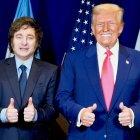
World
Trump meets with Javier Milei after Argentina's acceptance of reciprocal tariffs
Luis Francisco Orozco
"This is going to be part of a larger pivot away from conflicts in Europe and a pivot towards building alliances in Latin America and in the Western Hemisphere," the source told the NYP.
The news comes as relations between Washington and Europe are increasingly strained, following Zelensky's episode in the Oval Office last Friday, a date when Ukraine and the U.S. were scheduled to sign a strategic minerals deal and ended with the Ukrainian leader being sent out of the White House and quickly taking off for the U.K. later that evening.
Additionally, during a press briefing at the White House on Monday, Waltz addressed reporters in a defiant tone, stating that Washington "welcomes the Europeans taking a lead in European security."
Then, on Fox News, the senior National Security Advisor stated, "The American people’s patience is not unlimited, their wallets are not unlimited, and our stockpiles and munitions are not unlimited."
Prior to all these developments, several European leaders, especially in Germany, took it upon themselves to heat up the situation, reacting severely to JD Vance's harsh speech at the Munich Security Conference, where the American vice president expressed his concern about the advance of state censorship and the crusade against religious freedoms in the Old Continent.
Many European countries received Vance's words with concern, even reacting with a high tone, asking the U.S. vice president not to lecture Europe on how it "takes care" of democracy and instead question Russia for invading Ukraine.
Days after that speech, leaders of European powers met in Paris on an emergency basis to address Vance's words and Washington's neutral stance in the Ukraine-Russia war. From that point on, French President Emmanuel Macron took a leadership role, traveling to the White House and building a positive bridge with Trump that led to progress on the Ukraine agreements. However, it all went off the rails last week, in the Oval Office, when Zelensky and Vance began an on-camera spat that culminated in Trump asking the Ukrainian leader for respect.
Now, the UK has promised to help Ukraine more in financial and military terms while agreements between Washington and Kiev look, for now, distant.
Already, the Trump Administration has reached out to the region.
Beyond the cooling of relations with Europe, Washington's remarkable rapprochement with Latin American countries surprised many geopolitical experts who had been criticizing the White House for decades for abandoning its backyard while China was growing in influence by leaps and bounds.
For now, the president who seems to be most in tune with the White House is Argentina's Javier Milei, a libertarian economist who has repeatedly declared his sympathy for Trump and surprised the world with a miraculous economic plan to rescue Argentina from hyperinflation, monstrous fiscal deficit and financial ruin.
Milei has been so disruptive with his zero spending plan that he managed, in record time, to bring Argentina's finances into fiscal surplus, a milestone that had not happened for 14 years. He also fulfilled his main promise of reducing inflation, eliminating several ministries and cutting public works due to lack of visibility.
Milei's success was such that Elon Musk and former Republican pre-candidate Vivek Ramaswamy were inspired by the Argentine leader's program to develop the Department of Government Efficiency (DOGE) initiative, which is being central axis of the current Trump Administration in terms of cuts.
Now, the main challenge for Milei, who has met Trump on several occasions on his trips to the US, is to revive again Argentina's battered economy, which is now growing in a 'V' shape and needs to continue its acceleration to meet the goals of reducing poverty, unemployment and GDP expansion.
To this end, Milei is actively pursuing a trade agreement with the US, something Trump himself said he is considering while praising the Argentine president's work.
Argentina y Estados Unidos quieren firmar un tratado de libre comercio. Pero no pueden. ¿Por qué? Por el Mercosur.
— Juan Doe (@jdoedoe101101) March 3, 2025
Como está la cosa hoy, Brasil tiene poder de vetar cualquier acuerdo comercial que haga Milei con Trump. Perdonenme pero eso está mal.
pic.twitter.com/tivACgktnI
El Salvador and security
If Milei has been an economic role model for the Trump Administration, the El Salvadoran President Bukele is one on security.
Under his administration, El Salvador, once the most violent country in the world, began to be an example of how to combat gangs and reintegrate prisoners into society through a prison program where the most violent criminals are sent to maximum security prisons and common inmates to prisons where work and good behavior are encouraged to promote the development of the country and the recovery of human talent.
Under Bukele, in fact, murders were reduced to historic lows, and, according to a Gallup survey, 88% of Salvadoran citizens confirm that their country is among the safest in the world.
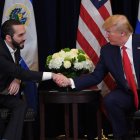
World
Acuerdo nuclear entre Estados Unidos y El Salvador: migración, energía y expansionismo chino
Luis Francisco Orozco
Given this success, Secretary of State, Marco Rubio, traveled to El Salvador to meet with Bukele and reach an unprecedented deal: an agreement between Washington and San Salvador to send dangerous criminals to Salvadoran prisons, generating economic benefits for both the US and El Salvador.
Bukele has already publicly stated that he is happy to receive criminals from the dangerous Venezuelan 'Tren de Aragua' gang, Mexican cartels, or the Mara Salvatrucha (MS-13) itself.
During that trip, El Salvador and the US also signed an agreement on nuclear energy, demonstrating Washington's recent interest in generating long-term alliances with Latin American countries.
Venezuela's big problem
Just when it seemed that Washington was ready to cozy up to the socialist regime of Nicolás Maduro in exchange for a controversial oil-migration agreement, Donald Trump surprised with a hard blow dealt to the Chavista dictatorship: he ordered the revocation of the oil licenses for which former President Joe Biden granted U.S. companies such as Chevron to buy Venezuelan oil in exchange for electoral guarantees in the South American country.
Maduro, who last July 2024 again committed electoral fraud, reacted violently to the measure by threatening and insulting Donald Trump and sending hooded regime officials to surround the house of opposition leader María Corina Machado, who has been in hiding for months amid a wave of persecution against opposition activists.
Machado, who learned of the revocation of the oil licenses in a interview with Donald Trump Jr., praised President Trump's move noting that, thanks to Biden's lifting of sanctions, Washington succeeded in making the Maduro regime financial for years.
Machado questioned Biden, accusing him of appeasing Maduro, whom she pointed out for sending criminals from the Aragua Train to the U.S. and flooding the country with drugs.
Now, with the revocation of the oil licenses, it seems that the Trump Administration is ready again to put pressure on Maduro, and its potential ally for this is a conservative opposition leader who, in addition to thanking Trump for the recent gesture, has promised that she is willing to generate economic agreements with Washington in exchange for the White House helping to depose the Chavista dictator.
RECOMMENDATION
